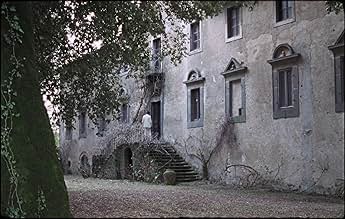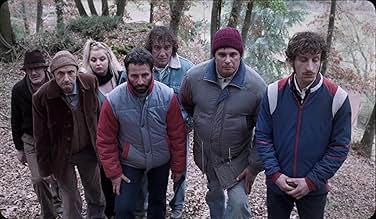Der englische Archäologe Arthur trifft sich wieder mit seinen unberechenbaren Komplizen - einem fröhlichen Kollektiv von Grabräubern, die durch das Plündern etruskischer Gräber und das Horte... Alles lesenDer englische Archäologe Arthur trifft sich wieder mit seinen unberechenbaren Komplizen - einem fröhlichen Kollektiv von Grabräubern, die durch das Plündern etruskischer Gräber und das Horten der ausgegrabenen antiken Schätze überleben.Der englische Archäologe Arthur trifft sich wieder mit seinen unberechenbaren Komplizen - einem fröhlichen Kollektiv von Grabräubern, die durch das Plündern etruskischer Gräber und das Horten der ausgegrabenen antiken Schätze überleben.
- Regie
- Drehbuch
- Hauptbesetzung
- Auszeichnungen
- 14 Gewinne & 53 Nominierungen insgesamt
Empfohlene Bewertungen
When an English tomb raider (Josh O'Connor) skilled at dowsing uses his skills to hunt down buried Etruscan artifacts, he achieves success at his craft but suffers setbacks when he falls in with the wrong crowd. As a consequence, he drifts through life, trying to find his way (and, ironically enough, a moral footing), an odyssey filled with quirky people and events, a would-be romantic interest (Carol Duarte) with two carefully concealed children, an aging operatic instructor (Isabella Rossellini) skilled at fleecing her "students," and, of course, his coterie of comical criminal cronies. Writer-director Alice Rohrwacher's latest tells a delightful fable full of wit, whimsy, colorful characters, high intrigue and its share of surreal moments, all set against the Italian landscape. The film admittedly takes a little time to find its stride, so getting through the opening act will require some patience (editing here would have helped). But, once the picture finds its way, it becomes a fun-filled ride, peppered with absurdist humor and filmed with Fellini-esque cinematography and a production design reminiscent of the famed auteur. With a runtime of 2:10:00, it could stand some trimming (most notably at the outset, as noted above), but this cinematic charmer is a modestly pleasant diversion to watch while stretched out on the couch while casually savoring a demitasse of espresso and a plate of biscotti. Godere!
La Chimera is a slow burning journey with plenty to say that's deliberately hard to pin down, making it all the more rewarding when it coalesces. Coincidentally, it's also the best film released in the last year about a grizzled archaeologist returning to recovering ancient artefacts on one last adventure whilst still grieving the loss of a loved one.
Josh O'Connor is so good at being reserved without being completely closed off. The only real emotion that he shows is anger but everything else is so clearly contained in his anguish and charming smile. He's supported by a crew of boisterous personalities who are initially a lot of fun to be around though not without their darker sides.
Alice Rohrwacher's direction draws you in and keeps you so invested that the subtle aspect ratio shifts almost go unnoticed. It's simultaneously a film that's very grounded with stunning locations which all feel lived in and at the same time has it's more surreal moments that imbues the film with a dreamlike nature, especially in its final moments.
Josh O'Connor is so good at being reserved without being completely closed off. The only real emotion that he shows is anger but everything else is so clearly contained in his anguish and charming smile. He's supported by a crew of boisterous personalities who are initially a lot of fun to be around though not without their darker sides.
Alice Rohrwacher's direction draws you in and keeps you so invested that the subtle aspect ratio shifts almost go unnoticed. It's simultaneously a film that's very grounded with stunning locations which all feel lived in and at the same time has it's more surreal moments that imbues the film with a dreamlike nature, especially in its final moments.
"La Chimera" is a bittersweet addition to the magical-Italian-realism cinematic universe of director Alice Rohrwacher. Her new parable about Italy that's also a folklore fairytale tells the story of clairvoyant/haunted archeologist/graverobber Arthur, played by Josh O'Connor. Arthur's journey to retrieve the film's buried namesake is not one for glory and it's barely for riches; O'Connor commits both emotionally and physically to a naturalistic portrait of a lost man searching for something that is beyond the tangible. This heavy-hearted quest is balanced thanks to moments orchestrated by Arthur's local gang of merry graverobbers, played by former collaborators from Rohrwacher films. Another great performance is by Isabella Rosellni, playing a women that is connected to Arthur through personal history and in her attachment to living in the past. The film is far less narrative-driven, instead choosing to follow Arthur from one moment to another, a nod to the wandering man of other Italian greats, Pasolini and Felini. The ending, similarly, leaves viewers with the choice of deciding whether Arthur was victorious in fulfilling his wish or not.
A rather scruffy looking Josh O'Connor is "Arthur" who has found a way to make a living in rural Italy where he uses his unique gift with a divining rod - well a big twig, really - to uncover ancient artefacts from deep beneath the surface. He's not averse to a bit of grave robbing either - for which he has recently been imprisoned, and now he and his cohorts sell their stuff to "Spartaco" (Alba Rohrwacher) and via a rather unique technique, too! What's clear is that "Arthur" is getting over something fairly monumental in his life, and we get a clue to that when he visits the rather doting but blissfully ignorant and elderly "Flora" (Isabella Rossellini) at her increasingly dilapidated mansion house where the furniture is destined for the furnace and her family all know the secret, but dare not speak it. He, himself, inhabits a shanty-town style shed abutting the old city wall, his once proud linen suit now grubby and filthy and he is rarely without a cigarette. As the plot unfolds - aided by an agreeably sparing amount of dialogue - we start to get a sense that "Arthur" is actually coming to his senses after something akin to a concussion. The pieces of his life are slowly coming together again as he and his pals make the discovery of a lifetime, only for... It's a slowly paced film, but that works well - as do the infrequent but quite punchy comedic elements of the drama. There can be a comparison drawn between the gradual unearthing of the long lost relics and with his own re-realisation but it's all delivered with a brightness that keeps it from becoming downbeat or depressing. Director Alice Rohrwacher offers us a personal story tempered with a bit of mythology and a fair degree of ill-defined humanity that is compellingly incomplete in many ways. I reckon it might merit a second watch, there's plenty of nuanced writing here.
An intriguing title, clearly "chimera" in the sense of a delusion or fantasy, and maybe specifically the illusion that anything at all can have permanence. Obviously we see that in the tombs of the people who lived thousands of years ago which are now being raided by this motley crew, but we also see it in the main character's relationship with his girlfriend, her mother's crumbling mansion, and the abandoned train station in town. Everything has its day, then fades away.
I have a dim view of those who pillage archaeological sites for personal gain, and probably because of that struggled initially to appreciate this film, but Rohrwacher's gentle, digressive style slowly worked its charms on me. I had been wondering if there would be any limit to what these tomb raiders might do since early on the Etruscan objects they find are relatively "minor," and the moment they discover a breathtaking shrine, creating a moral crisis for the leader, was brilliant. I shuddered when the head of a sculpture was broken off for easier transport. We then find that they're just smaller operators in a chain of corruption that extends from the wealthy to museum curators, calling to mind real-life scandals. The monetization of priceless artifacts feels like an affront in every possible way, and the main character looking down at the goddess's head felt like he was staring into his own soul.
However that's not the final moment of truth, and he comes to another fork in the road of his life, the choice between a new relationship with a woman who is ironically renovating a living space out of ruins, or to continue using his gift for divination to pillage ancient sites despite his growing guilt. Spiritually it's a life or death choice, and we find that literally that's true too. There's something stirring about our all-too-human weakness in the face of the past which looks silently back at us, a reminder that all of our greed and maneuvering is meaningless, one we don't heed.
I have a dim view of those who pillage archaeological sites for personal gain, and probably because of that struggled initially to appreciate this film, but Rohrwacher's gentle, digressive style slowly worked its charms on me. I had been wondering if there would be any limit to what these tomb raiders might do since early on the Etruscan objects they find are relatively "minor," and the moment they discover a breathtaking shrine, creating a moral crisis for the leader, was brilliant. I shuddered when the head of a sculpture was broken off for easier transport. We then find that they're just smaller operators in a chain of corruption that extends from the wealthy to museum curators, calling to mind real-life scandals. The monetization of priceless artifacts feels like an affront in every possible way, and the main character looking down at the goddess's head felt like he was staring into his own soul.
However that's not the final moment of truth, and he comes to another fork in the road of his life, the choice between a new relationship with a woman who is ironically renovating a living space out of ruins, or to continue using his gift for divination to pillage ancient sites despite his growing guilt. Spiritually it's a life or death choice, and we find that literally that's true too. There's something stirring about our all-too-human weakness in the face of the past which looks silently back at us, a reminder that all of our greed and maneuvering is meaningless, one we don't heed.
Wusstest du schon
- WissenswertesJosh O'Connor filmed the first half of La Chimera prior to filming his role as Patrick Zweig in Challengers, then returned to Italy to complete the second half.
- Soundtracks'Toccata-Ritornello-Sinfonia' from 'L'Orfeo'
Composed by Claudio Monteverdi
Performed by Le Concert des Nations & La Capella Reial de Catalunya
Conducted by Jordi Savall
Top-Auswahl
Melde dich zum Bewerten an und greife auf die Watchlist für personalisierte Empfehlungen zu.
- How long is La Chimera?Powered by Alexa
Details
- Erscheinungsdatum
- Herkunftsländer
- Sprachen
- Auch bekannt als
- La quimera
- Drehorte
- Produktionsfirmen
- Weitere beteiligte Unternehmen bei IMDbPro anzeigen
Box Office
- Budget
- 9.600.000 € (geschätzt)
- Bruttoertrag in den USA und Kanada
- 1.004.503 $
- Eröffnungswochenende in den USA und in Kanada
- 44.511 $
- 31. März 2024
- Weltweiter Bruttoertrag
- 5.235.030 $
- Laufzeit
- 2 Std. 11 Min.(131 min)
- Farbe
- Sound-Mix
- Seitenverhältnis
- 1.78 : 1
Zu dieser Seite beitragen
Bearbeitung vorschlagen oder fehlenden Inhalt hinzufügen


















